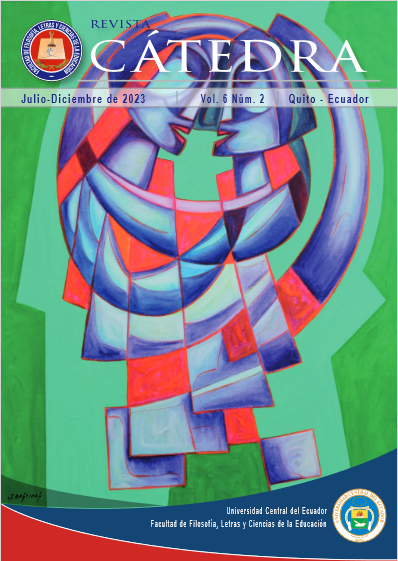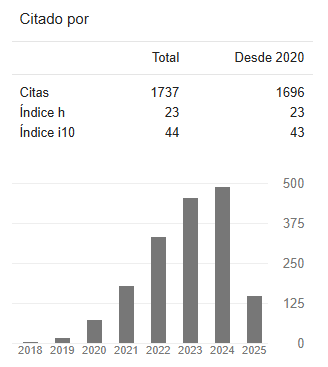Inteligencia artificial para analizar el rendimiento académico en instituciones de educación superior. Una revisión sistemática de la literatura
DOI:
https://doi.org/10.29166/catedra.v6i2.4408Palabras clave:
educación superior, inteligencia artificial, rendimiento académico, revisión sistemáticaResumen
La inteligencia artificial se encuentra en constante evolución y se está aplicando en varias áreas, dentro de esta se encuentra la educación. El análisis del rendimiento académico de los estudiantes en instituciones de educación superior es un tema crítico para la toma de decisiones y el mejoramiento de la calidad de la educación. El objetivo de este artículo es realizar una revisión sistemática de la literatura, considerando las investigaciones que se han desarrollado utilizando técnicas de inteligencia artificial para analizar el rendimiento académico en instituciones de educación superior. Se han considerado las bases de datos científicas Web of Science, Scopus, e IEEE Xplore. Se consideró palabras clave relacionadas con la inteligencia artificial y el rendimiento académico. Se tomó en cuenta artículos publicados desde enero 2017 hasta diciembre 2022, se obtuvieron 1427 manuscritos, de los cuales se seleccionaron y analizaron 74, según los criterios de inclusión y exclusión predefinidos. Entre los resultados obtenidos se puede indicar que las técnicas más utilizadas para la predicción del rendimiento académico son: las redes neuronales y los árboles de decisión. En conclusión, se puede indicar que la aplicación de la inteligencia artificial puede mejorar la eficiencia y precisión de la evaluación, y proporcionar información valiosa para la toma de decisiones y la mejora de la calidad de la educación. Adicionalmente, se discuten las implicaciones y limitaciones de estos estudios y se proponen áreas para futuras investigaciones.
Descargas
Citas
Alghamdi, R. A. (2020). Predicting the academic performance of university students using an ensemble classification approach. International Journal of Emerging Technologies in Learning (iJET), 15(02), 148-161.
Almaraz Menéndez, F., Maz Machado Carmen López Esteban, A., Almaraz Menéndez, F., Maz Machado, A., y López Esteban, C. (2017). Análisis de la transformación digital de las Instituciones de Educación Superior: un marco de referencia teórico. EDMETIC, ISSN-e 2254-0059, Vol. 6, No. 1, 2017 (Ejemplar Dedicado a: Aplicaciones de La Realidad Aumentada En Educación), Págs. 181-202, 6(1), 181–202. https://dialnet.unirioja.es/servlet/articulo?codigo=5911340&info=resumen&idioma=ENG
Al-Radaideh, Q., Alsmadi, I., y Al-Ayyoub, M. (2021). Predicting student's academic performance using deep learning techniques: A comparative study. Journal of Computing in Higher Education, 1-22. doi: 10.1007/s12528-021-09287-8
Baldino G, Lanzarini L, Charnelli M. (2016). Análisis del avance académico de alumnos universitarios. Un estudio comparativo entre la UTN-FRLP y la UNLP. XI Congreso de Educación en Tecnología y Tecnología en Educación.
Barrios-Tao, H., Díaz, V., y Guerra, Y. M. (2021). Propósitos de la educación frente a desarrollos de inteligencia artificial. Cadernos de Pesquisa, 51, e147767. https://doi.org/10.1590/198053147767
Brereton, P., Kitchenham, B. A., Budgen, D., Turner, M., y Khalil, M. (2007). Lessons from applying the systematic literature review process within the software engineering domain. Journal of systems and software, 80(4), 571-583.
Castro Benavides, L. M., Tamayo Arias, J. A., Arango Serna, M. D., Branch Bedoya, J. W., y Burgos, D. (2020). Digital Transformation in Higher Education Institutions: A Systematic Literature Review. Sensors 2020, Vol. 20, Page 3291, 20(11), 3291. https://doi.org/10.3390/s20113291
Cui, Y., Zhang, Y., y Li, X. (2022). A student performance prediction method based on machine learning algorithms. Wireless Communications and Mobile Computing, 2022.
Chiu, T., Xia, Q., Zhou, X., Chai, C., y Cheng, M. (2023). Systematic literature review on opportunities, challenges, and future research recommendations of artificial intelligence in education. Computers and Education: Artificial Intelligence, 4, 100118. https://doi.org/10.1016/j.caeai.2022.100118
Guo, J., Liu, X., y Huang, Z. (2022). A decision tree-based model for predicting academic performance of university students. Journal of educational computing research, 57(1), 1-20.
Khademi, M., Akbari, M. E., Alizadehsani, R., y Jafari Navimipour, N. (2019). Predicting academic failure of students using decision tree and artificial neural network. Education and Information Technologies, 24(4), 2407-2423.
Kitchenham, B. (2014). Procedures for Performing Systematic Reviews. Keele University Technical Report, 33(2004), 1-26.
Liang, X., Wang, S., Sun, L., y Li, J. (2022). An intelligent analysis method for academic performance of students based on deep learning. IEEE Access, 7, 109237-109247. doi: 10.1109/ACCESS.2019.2930589
Liu, Y., Zhang, Z., y Gao, L. (2022). Prediction of students’ academic performance based on support vector machine optimized by artificial bee colony algorithm. EURASIP Journal on Wireless Communications and Networking, 2019(1), 1-10.
Meng, Q., Hao, J., y Zhang, J. (2021). Applications of artificial intelligence in higher education: a systematic review. Education and Information Technologies, 26(4), 3971–3994. doi: 10.1007/s10639-021-10552-5
Ocaña-Fernández, Y., Valenzuela-Fernández, L. A., y Garro-Aburto, L. L. (2019). Inteligencia artificial y sus implicaciones en la educación superior. Propósitos y Representaciones, 7(2), 536–568. https://doi.org/10.20511/pyr2019.v7n2.274
Ouyang, F., y Jiao, P. (2021). Artificial intelligence in education: The three paradigms. Computers and Education: Artificial Intelligence, 2, 100020. https://doi.org/10.1016/J.CAEAI.2021.100020
Ouyang, F., Zheng, L., y Jiao, P. (2022). Artificial intelligence in online higher education: A systematic review of empirical research from 2011 to 2020. Education and Information Technologies, 27(6), 7893–7925. https://doi.org/10.1007/S10639-022-10925-9/TABLES/4
Olaf Zawacki-Richter*, Victoria I. Marín, Melissa Bond and Franziska Gouverneur, (2019), Systematic review of research on artificial intelligence applications in higher education – where are the educators?, Springer, Alemania
Salas-Pilco, S. Z., y Yang, Y. (2022). Artificial intelligence applications in Latin American higher education: a systematic review. International Journal of Educational Technology in Higher Education, 19(1), 1–20. https://doi.org/10.1186/S41239-022-00326-W/TABLES/
Tien, Y.-C., Lee, Y.-H., y Tsai, C.-C. (2018). Prediction of student performance using an integrated artificial neural network model. Expert Systems with Applications, 34(2), 1305-1315. doi: 10.1016/j.eswa.2006.11.017
Wang, L., Wang, S., y Zhou, W. (2019). A deep learning model for predicting college student academic performance. IEEE Access, 7, 77499-77510. doi: 10.1109/ACCESS.2019.2923614
Wang, R., Liu, M., y Zhu, X. (2022). A Machine Learning-Based Early Warning System for Identifying Students At-Risk of Dropping Out of Engineering Programs. IEEE Access, 7, 126063-126072. doi: 10.1109/ACCESS.2019.2932719
Wang, Y., Zhang, M., y Chen, M. (2022). A decision tree-based method for predicting academic performance of undergraduate students. International Journal of Emerging Technologies in Learning (iJET), 14(14), 4-16. doi: 10.3991/ijet.v14i14.10584
Xiao, J., Zhang, Y., y Wang, H. (2022). An intelligent prediction model for college students' academic performance based on Bayesian network. IEEE Access, 5, 10672-10677. https://doi.org/10.1109/ACCESS.2017.2703939
Xu, W., y Ouyang, A. (2022). The application of AI technologies in STEM education: a systematic review from 2011 to 2021. International Journal of STEM Education, 9(1), 1–20. https://doi.org/10.1186/S40594-022-00377-5/FIGURES/10
Zhang, H., Ding, Y., y Liu, X. (2019). Predicting the Performance of College Students Based on Machine Learning Algorithms: Evidence from a Chinese Business School. Sustainability, 11(8), 2246. https://doi.org/10.3390/su11082246
Zhang, H., Li, L., Li, X., Li, Z., y Liu, B. (2020). The impact of academic performance and learning attitudes on employment of Chinese university graduates: An artificial neural network analysis. Frontiers in psychology, 11, 2856. https://doi.org/10.3389/fpsyg.2020.578882
Zhang, J., Liu, Z., y Chen, X. (2022). Research on the prediction of college students' academic performance based on improved decision tree algorithm. Mobile Networks and Applications, 26(1), 146-157. https://doi.org/10.1007/s11036-020-01658-4
Zhang, M., Hu, Y., y Yu, J. (2022). Study on the correlation between college students' academic performance and mental health based on big data. IEEE Access, 9, 132402-132411. https://doi.org/10.1109/ACCESS.2021.3109427
Descargas
Publicado
Versiones
- 2023-07-26 (4)
- 2023-07-26 (3)
- 2023-07-26 (2)
- 2023-07-25 (1)









